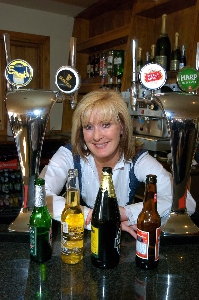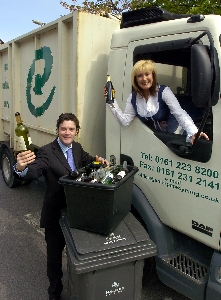|
CORONATION STREET STAR ASKS MERSEYSIDE: HAVE YOU GOT THE BOTTLE?

ROVER'S Return
landlady and real-life pub owner, Beverley Callard, is encouraging
licensed business premises on Merseyside to reduce the amount of
glass that the area currently sends to landfill. The actress
is championing the Have You Got the Bottle? campaign which is
targeting almost 1,500 licensed premises across Merseyside. The
initiative aims to reduce the amount of glass sent to landfill by
the hospitality industry, a figure which currently stands more than
3,700 tonnes (11 million bottles) for Merseyside alone, by
encouraging businesses to sign up to a glass bottle collection
service and change the way they deal with glass waste.

Despite the fact that the North West is home to 13 glass collectors
the region still produces 51,000 tonnes of waste glass per year, one
of the highest figures in the UK. Although consumers are
increasingly finding it easier to recycle their glass and are making
use of bottle banks and colour-coded domestic bins, the commercial
sector is lagging behind. In particular, licensed retailers are one
of the largest generators of glass waste and currently only 35% of
retailers in the North West recycle their glass.
Every tonne of glass that is recycled prevents the quarrying of 1.2
tonnes of raw material and avoids the release of 300kg of CO2 into
the atmosphere. If the 3,700 tonnes of glass that is sent to
landfill by Merseyside's licensees each year were recycled it would
save over 1,000 tonnes of CO2 from being emitted into the
atmosphere, the same as taking 344 family cars off the road for a
year.
Have You Got the Bottle? has been launched by Envirolink
Northwest the support organisation for the northwest's Recycling and
Waste Industry. The campaign will use direct mail, a dedicated
website, media relations and other marketing techniques to
communicate with the hospitality industry throughout Merseyside.
Licensees will receive an informative leaflet over the coming days,
providing details of how they can pledge their support to the
campaign. Those interested will then be able to log on to the
website and
find their local glass collection agency by typing in their nearest
town or postcode. The website will provide tips for successful
recycling and detailed case studies of businesses already
successfully taking part, and allow access to the latest statistics
and data on glass recycling.
Beverley Callard was chosen to front the campaign because of her
on-screen persona and her capacity as a real life landlady. She
already has one pub in Eccles and has recently become landlady of
The Gallery in Hale Barns, Altrincham. She said:- "I'm
delighted to have been chosen to front the campaign. My family are
all keen recyclers and I'm determined that our business will also
reflect these values. I'll be working with Hydes, the brewery behind
my new pub, to make sure we recycle all of our glass."
Envirolink hopes that licensed businesses will recognise both the
environmental benefits and the business benefits that involvement in
Have You Got the Bottle? will provide. Campaign spokesperson, Graeme
Mullin said:- "The benefits to the environment of this scheme
are obvious; glass is 100% recyclable. Despite this, the amount of
glass sent to landfill in Merseyside is huge. By recycling just one
glass bottle you could save enough energy to power a 100 watt light
bulb for almost an hour. Plus, going green is good for
business. Customers are increasingly aware of, and interested in,
environmental issues and are supportive of organisations who
demonstrate that they care. Those who participate in the scheme will
also experience significant savings. Landfill Tax is set to increase
by £8 per year from April 2008, meaning bin lift charges for general
waste will increase by around 20% so participation in a recycling
scheme represents a real opportunity to save money for hospitality
businesses."
|
HALF OF UK WORKFORCE HAS 1 FOOT OUT OF THE DOOR
BRITISH
business is in the grip of a trend which is set to cost £4.6
billion. Nearly half of all employees in the UK are committed
to changing career in the near future, meaning rocketing recruitment
and training costs for British business as it struggles to plug the
gaps. According to a study by business psychology experts OPP,
44% of the UK workforce is intending to change career as the ‘job
for life’ culture is further eroded. Over half of us have
changed career already, with 1 in 5 having made the move 3 times.
The trend of career
changers, dubbed “career nomads” is good news for
recruitment companies - businesses have to spend an estimated £3,600
to recruit the average employee. But with half of us on the
way out of the door, the bill will become a headache for employers
everywhere. A lack of fulfilment seems to be the key factor
behind those looking for new careers, with 43% saying it’s the main
reason they’d like a different job. But for almost as many (42%), a
greater sense of self awareness is the spur. A similar number is
looking to earn more by changing career.
Lucy McGee, Head of Marketing at OPP, comments:-
“Organisations put a huge amount of time, effort and money into
recruiting the best people, but far less attention is paid to
retaining them and guiding them through a career path that meets
their changing ambitions. Understanding what motivates and
drives employees enables organisations to get the best out of people
as they grow, and keep them engaged and challenged. This can mean
flexing roles to better suit the strengths of individuals, which may
seem a lot of effort, but how many businesses can afford the vicious
cycle of ‘train, career churn, re-train’ that this research exposes?
There are a number of simple but accurate – and now very accessible
- methods that can help businesses better understand their
employees’ personal strengths and preferences, as well as how these
could be best deployed. This research has also shown that a third of
employers have no structured assessment or feedback process in
place, so it certainly seems British business can be doing a lot
more to understand and play to the strengths of their people.
The cost associated with people ‘starting over’ - with
all the organisational support involved - is better spent on helping
people deepen their expertise and experience in the right career.
This benefits the whole organisation and generates sustainable
success.”
MEP
PROPOSES BIG CO2 CUTS FROM CARS
CAR
manufacturers will face severe restrictions to curb CO2 emissions
from new cars if plans being put to the European Parliament gain
approval. Southport MEP Chris Davies, the Parliament's
rapporteur, presented his proposals to its Environment Committee on
26 June. He called for average emissions from new cars to be
cut by more than a quarter by 2015, and by 42% by 2020, purely by
technical improvements. This would require carbon emissions to be
reduced to 120g CO2/km and 95g CO2/km respectively. Latest figures
suggest that new cars placed on the European market are emitting an
average of 162g CO2/km.
The 2015 target proposed by the Liberal Democrat MEP is more
environmentally ambitious than suggested in January by the European
Commission but gives the industry more time in order make the design
changes necessary. To secure the goal Mr Davies will call for
the creation of a new market mechanism, the Carbon Allowance
Reduction System (CARS). Manufacturers and importers will be
required to pay a penalty in proportion to the emissions that their
vehicles produce above an annual benchmark, but will be able to
claim financial credits for vehicles emitting less than the average.
Controversially he says that new vehicles should not be awarded type
approval if they are built to exceed the maximum speed limit of 130
kilometres per hour applying in most European countries by more than
25% (162kmh or 101mph).
Mr Davies said:- "Cars designed to go at stupid speeds have to
be built to withstand the effects of a crash at those speeds. They
are heavier than necessary, less fuel efficient and produce too many
emissions. At a time when Europe is worried about its energy
security it is sheer lunacy to approve the sale of gas guzzling cars
designed to travel at dangerous speeds that the law does not
permit."
The MEP is also calling for a major shift in the advertising of new
cars, with 20% of all space devoted to information about fuel
economy and CO2 emissions.
Mr Davies said:- "We give information to smokers about the
effects of cigarettes, so why should we not insist that car makers
give customers more information about emissions from the vehicles
they sell?"
Some 19% of all Europe's carbon emissions come from passenger cars
and light-commercial vehicles. Absolute volumes of CO2 continue to
rise because of the growing number of cars on the roads, their
greater size and much increased power.
 |

